Your basket is currently empty!
Written by
Different Types of Boilers Explained: The Pros & Cons

What are the different types of boilers in the UK?
You might think you’d have to remember several types of boilers, but actually, there are only 3 modern boilers you need to know about if you are using natural gas, LPG or Oil as a fuel.
- Regular or heat only boilers
- Combi boilers
- System boilers
All these heat your hot water and central heating system as you would expect but how they work is different. If you moved into a house and started using taps and turning up the central heating, most people wouldn’t know any different.
When buying a new one, on the other hand, it does matter.
Get a fixed price online in just 20 seconds – Click here
Get your Fixed Price Boiler Quotes Online
New Gas Boilers with £0 Deposit & 0% Interest Finance Availble
Get the best quotes for boiler installation online in under 1 minute now
Types of Boilers and Different Fuels
Some boilers use different kinds of fuel to work, whether this is oil, LPG or natural gases.
There are even biomass and electric boilers available, which don’t use any of these fuels, making it ideal for some people.
Each fuel that is used in these boilers has their own benefits and disadvantages, depending on the situation each person finds themselves in.
You can find the right kind of boiler for you by understanding how they all work!
Natural Gas Boiler
Natural gas boilers also burn their fuel, which is stored in a tank, so that the fuel can then heat up the water ready for use. Once again, this is extremely similar to how LPG and oil boilers work, whilst also having both similar and unique disadvantages.
Advantages and disadvantages of natural gas boilers
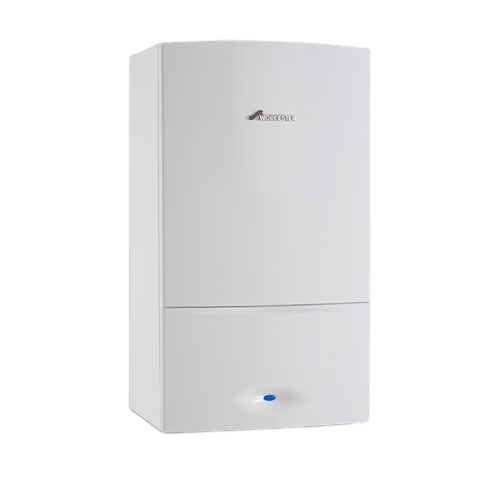
Advantages
- Like both LPG and oil boilers, natural gas boilers are very efficient and waste very little of the fuel
- Doesn’t produce many carbon emissions, making it one of the cleaner fuels used in boilers and more eco-friendly than oil boiler systems
- Ideal for a smaller budget as they aren’t as costly as other kinds of boilers
Disadvantages
- Space is needed to store the natural gas tank, making it less ideal for smaller or less spacious households
- Risk of gas leaks – if the boiler is broken, there is a chance that the boiler can leak the gas being stored in the tank, which can potentially be harmful to people
Regular (Heat Only) Boilers
This is one of the original types of boilers. Regular boilers (also known as conventional boilers) are essentially made of three components:
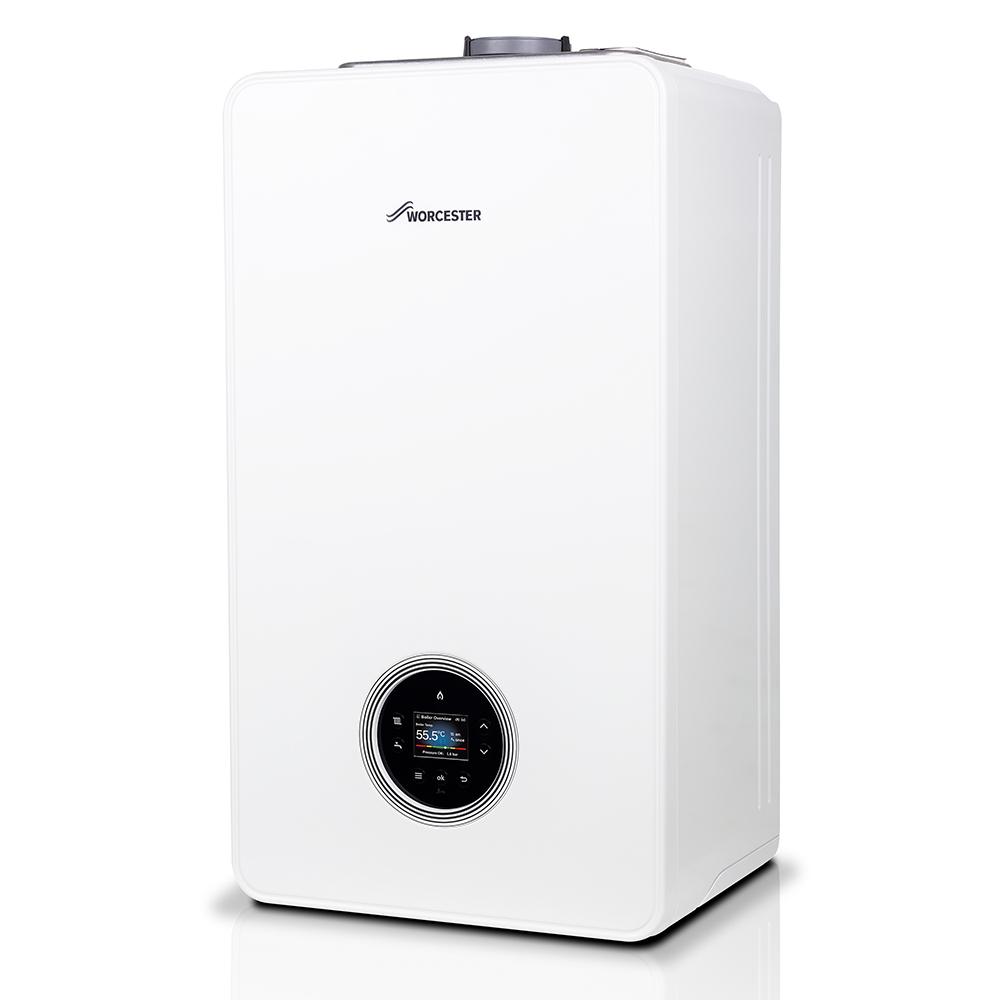
- Hot water cylinder/storage tank
- Cold water storage tank
- The boiler itself
A conventional boiler system will have the hot water stored in the hot water cylinder, where you’ll also have access to an on/off switch so you can turn your heat only boiler on when in use and off when not in use.
But how do heat-only boilers work?
How Does a Regular/Conventional Boiler Work?
- Cold water is supplied to your heat-only boiler through the cold water tank (Your cold water tank is usually installed in the loft/attic).
- Your heat-only boiler then directly feeds hot water to your central heating system such as your radiators.
- Hello, hot water!
This type of system for a regular boiler type is also called an open vented heat system like a Feed and Expansion tank.
Get your Fixed Price Boiler Quotes Online
New Gas Boilers with £0 Deposit & 0% Interest Finance Availble
Get the best quotes for boiler installation online in under 1 minute now
Advantages & disadvantages of the regular type of boiler
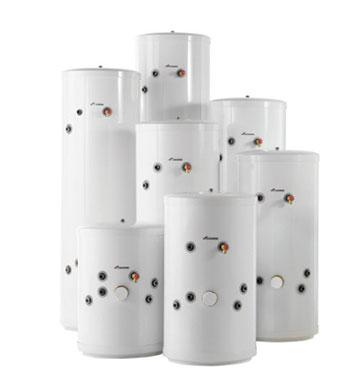
Advantages
- A regular boiler is most ideal for a house with old radiators. Older radiators that cannot tolerate high water pressure are ideally suited to regular boilers. Unlike combi or system boilers which would potentially leak if there was high water pressure
- Cheapest option among all the three types
- Conventional boilers have the lowest replacement costs
- Better for larger homes with higher hot water demand
- If your conventional boiler breaks down, there is still a hot water supply available if a an electrical immersion heater is installed to the hot water cylinder
Disadvantages
- You’ll need extra space to install a cold water feed tank either in your loft or attic
- If your hot water storage tank runs out of water, you’ll have to wait for the water to heat up again.
- Conventional boilers are not as efficient
A Regular/Heat Only Boiler is Best For:
A conventional boiler has its ups and downs. Still, they’re perfect for certain households, specifically:
- If you have high hot water demands
- You have multiple bathrooms or live in a large household
- If your area suffers from low water pressure
- If you have an old heat system that can no longer tolerate high water pressure
Get your Fixed Price Boiler Quotes Online
New Gas Boilers with £0 Deposit & 0% Interest Finance Availble
Get the best quotes for boiler installation online in under 1 minute now
Type of gas boiler – Combi Boilers
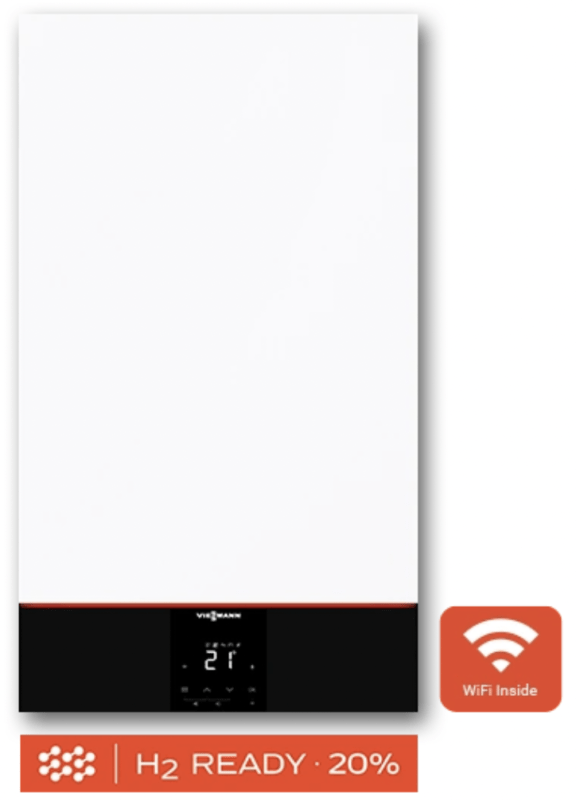
Combi boilers are the smallest among all three. They’re also the most common.
But that doesn’t mean they’re an ideal choice for you. With a combi boiler, both your heating and hot water demand are supplied via a single heating unit.
Allow us to explain further below.
How Does a Combi Boiler Work?
A Combi boiler is typically hung on a wall, giving it a neater, space-saving look:
Here’s how a best combi boiler works:
- Combi boilers use a heat exchanger (metallic) to heat water on-demand, meaning…no waiting time
- Your heat exchanger burns fuel such as gas or oil to achieve combustion and produce hot water.
Unlike system and regular types, gas combi boilers don’t require a tank. A combi boiler doesn’t carry the definition of storing hot water in its book. Instead, combi boilers heat water directly from the cold mains.
Advantages & disadvantages of combi type of boiler
Advantages
- Combi boilers are compact, neat-looking, and saves a lot of space
- Worry less about boiler installation since it doesn’t require a hot water cylinder nor a cold water tank
- Instantly heats the water so you don’t have to wait
- The most energy-efficient boiler among all three
- Great for the average 3 bedroom homes in the UK
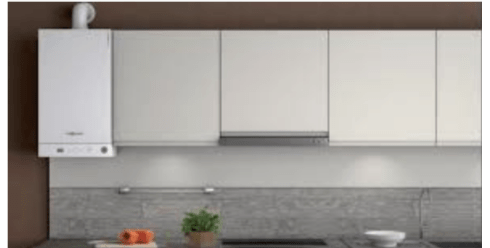
Disadvantages
- Although energy-efficient, a combi boiler become less efficient and effective when installed in a larger home
- If you have low mains water pressure, your combi boiler won’t work as well as you expect it to
- If two or more outlets are used simultaneously, your water flow rate is reduced. For example, showering and washing your face in the sink simultaneously will only lead to at least one having hot water
A combi boiler is best for:
A combi boiler can definitely help you save on heating bills, but it can also increase it if you’re using this boiler system for a home that shouldn’t have it in the first place.
A combination boiler is best for:
- Smaller households or areas with limited space
- If you have fewer bathrooms
- Ideal for areas with good water flow rates and pressure
Get your Fixed Price Boiler Quotes Online
New Gas Boilers with £0 Deposit & 0% Interest Finance Availble
Get the best quotes for boiler installation online in under 1 minute now
Type of Gas Boiler – System Boilers
A system boiler is an upgraded version of heat-only boilers and without the external hot water system components, making it less bulky.
How do system boilers work? Let’s find out!
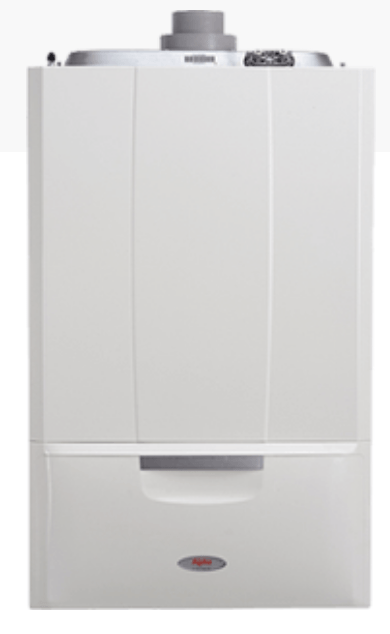
How Does a System Boiler Work?
The first thing you should know about a system boiler is they have a separate hot water cylinder. You also noticed how heat-only types have a hot water storage cylinder.
The difference between a system and heat-only boiler types, in this case, is that system boilers are unvented boiler systems.
This means a system boiler is less bulky.
To explain further, a system boiler has fewer external components, meaning:
- No hot water tank installed in your loft/attic.
- Pumps and valves are integrated into a system boiler
The way a system boiler works is similar to a heat-only type of boiler.
Although a heat-only type of boiler requires an expansion tank, a system boiler uses an expansion vessel where water is supplied to your boiler via the mains.
Advantages & disadvantages of system type of boiler
Advantages
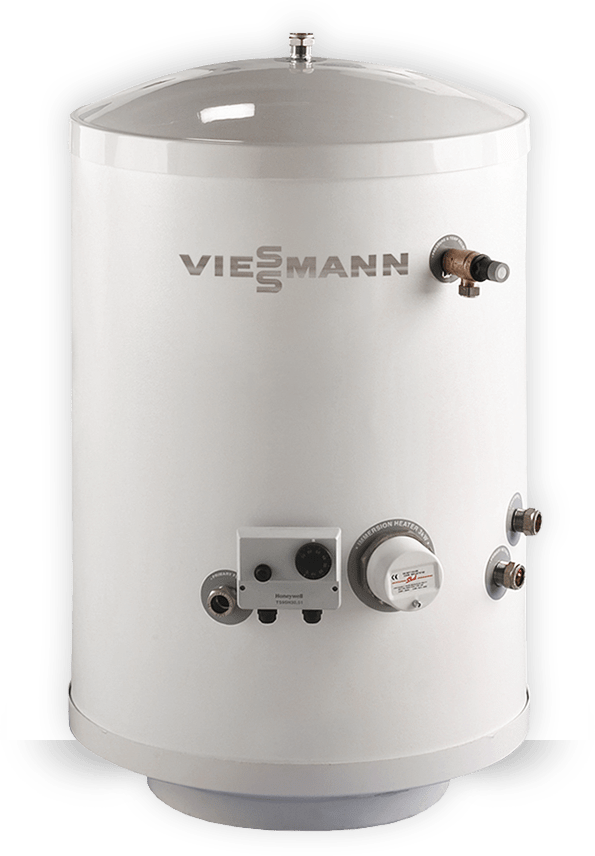
- The internal components integrated into its design makes it easier to install while saving space
- Since it doesn’t require extra components in the attic, this makes it less prone to freezing or potential leaks during winter
- Great for areas with high hot water demands since its unvented boiler system allows it to deliver good water rates to multiple outlets
Disadvantages
- You still need to allocate some space for the cylinder
- More expensive than the two types of boiler: combi and heat only. To learn more check out our guide on system boiler prices and installation costs.
- Just like traditional boilers, you’re not exactly getting instant hot water. Once the cylinder runs out of hot water, you’ll have to wait for it to heat up so you can get hot tap again
- Not so good for smaller homes with no space
A system boiler is best for:
Here’s who would benefit the most:
- If you have multiple bathrooms or hot water outlets
- You’re looking to replace your heat only boiler and want an upgraded version
- You prefer minimal hassle and struggle during the installation process
- You live in an area with lower mains pressure
Condensing and Non-condensing boilers
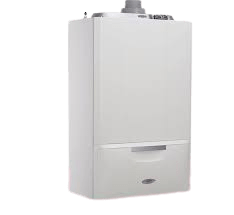
Almost all boilers today are condensing boilers as the UK legally stopped all production of non-condensing boilers in 2005.
This makes sense as condensing boilers are much more effective than non-condensing due to them using less energy and are more efficient in producing hot water.
Read our in-depth guide on condensing boilers to learn more about this type of heating system.
Oil Boilers
Oil boilers will be useful to people who are more isolated and off-grid as they won’t have any connections to facilities such as gas or electricity lines. The boiler is fitted in with an oil tank which will be ignite the oil to produce hot gases. These hot gases will then pass through a heat exchanger to heat up the water, allowing it to be used around the household via faucets, radiators or showers.
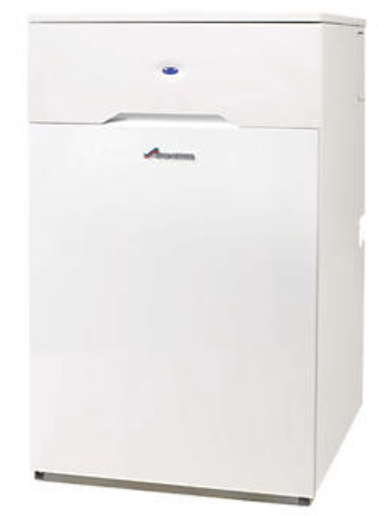
Advantages and disadvantages of an oil boiler
Advantages
- Oiler boilers can be useful for households that are off-grid and don’t have connections to gas and electric lines.
- Very high efficiency – there is very little waste of oil so the value for efficiency is high
Disadvantages
- An oil boiler is fitted with an oil tank meaning space will have to be allocated for that to be installed
- Can be very environmentally damaging – burning oil produces more carbon than other types of boilers which damages the atmosphere and environment
- The boiler requires oil to work and heat water, meaning that it must be regularly refilled and cannot work if the oil runs out
Get your Fixed Price Boiler Quotes Online
New Gas Boilers with £0 Deposit & 0% Interest Finance Availble
Get the best quotes for boiler installation online in under 1 minute now
LPG Boilers
LPG Boilers (short for liquefied petroleum gas) work similarly to how other fuelled boilers do, as the gas is heated, in turn heating up the water, making hot water ready to use. LPG boilers also require a tank to be fitted, which will store the fuel, ready for use whenever needed.
Advantages and disadvantages of LPG boilers
Advantages
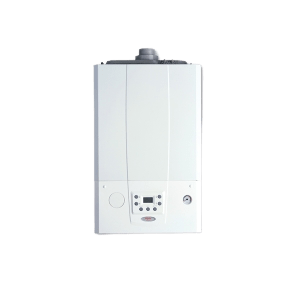
- Although small amount of carbon and other polluting gases are produced in LPG boilers, they are the most environmentally friendly of all the fuel boilers
- They are cheaper than gas and oil boilers meaning more money is saved on heating and energy bills
- LPG boilers are extremely efficient and let very little of the fuel go to waste
Disadvantages
- Much like oil and gas, there must be space to fit in the fuel tank where LPG is stored, not making it ideal for smaller households
- LPG boilers, like other boilers using fuel, require regular refills meaning they cannot work if the fuel runs out
Electric Boilers
An electric boiler doesn’t use any kind of fuel or gas to heat the water up, but instead uses electricity to produce it. The electric boiler has heating components that are powered electrically, therefore heating up the water, allowing it to be used for showers, radiators and taps.

Advantages and disadvantages of electric boilers
Advantages
- An electric boiler is almost completely energy efficient meaning barely any heat is lost when in use
- Ideal for smaller spaces and households due to there being no requirement of a fuel tank
- Because of a lack of fuel, an electric boiler doesn’t run out means to heat the water, meaning it won’t run out
Disadvantages
- Despite not using any fuel directly, electricity is produced by burning fossil fuels, making it one of the least eco-friendly ways to produce hot water
- Energy bills may increase due the extra electricity being used with an electric boiler
Biomass Boilers
Biomass boilers refers to boiler systems that heat up water by burning biomass fuels. An example of this is using wooden logs or pellets which are loaded into the boiler, where the fuel is burned, producing energy that is then used to heat the water and is ready for use.
Advantages and disadvantages of biomass boilers
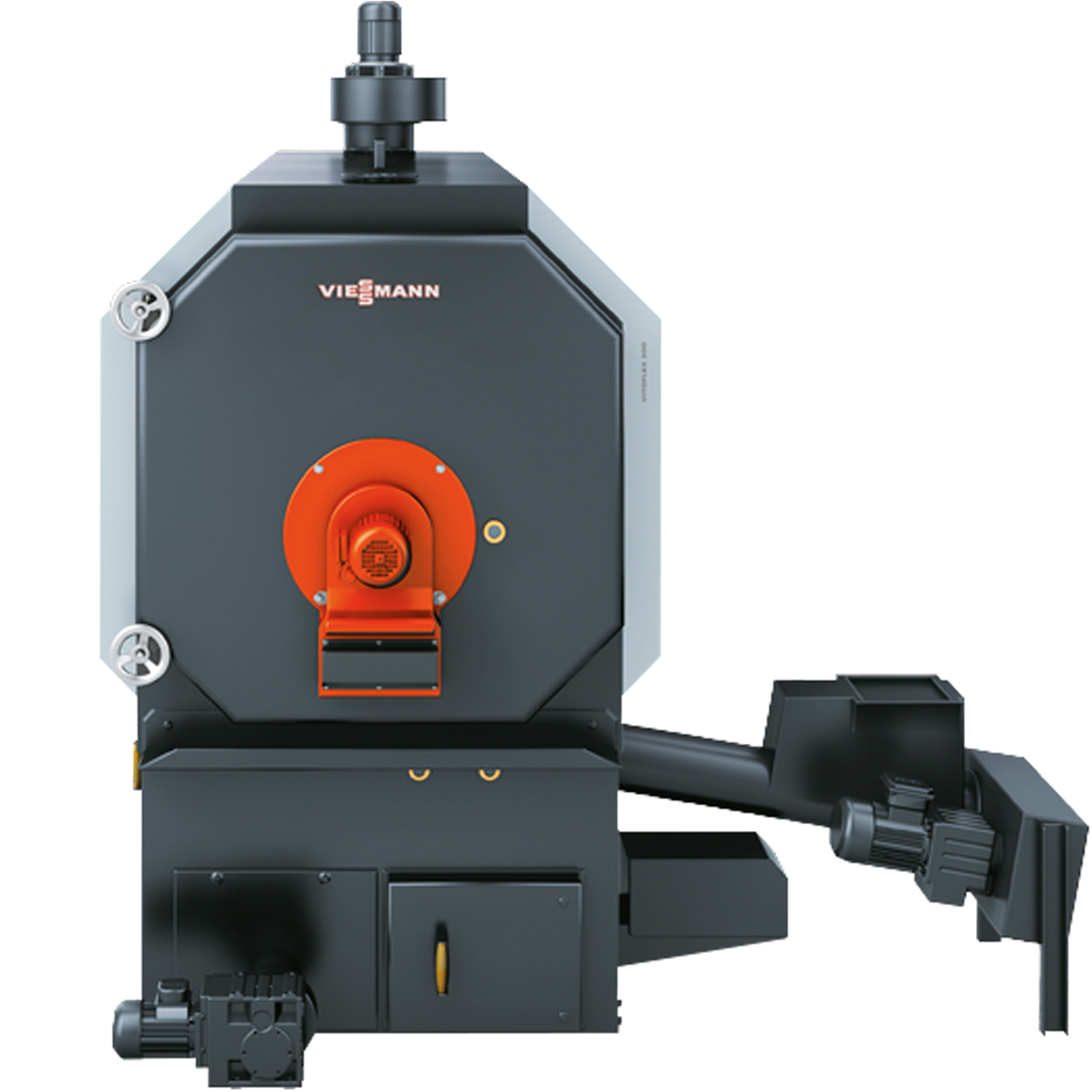
Advantages
- It is environmentally friendly as any carbon realised from burning is the same amount it has taken in throughout the plants life
- Good for households with limited connection to electrical and gas lines as energy is self-produced
- Biofuel is cheaper to the get than fuels for oil or gas boilers
Disadvantages
- Installing a biomass boiler takes up a lot of space meaning it isn’t suitable for smaller households
- They must be regularly refuelled to work rather than having constant access to hot water
Get your Fixed Price Boiler Quotes Online
New Gas Boilers with £0 Deposit & 0% Interest Finance Availble
Get the best quotes for boiler installation online in under 1 minute now
Hybrid Heat Pump Systems
Hybrid heating system takes two separate technologies and combines the two, and they work together to produce the heat in your home. These hybrid heat pump systems usually involve a combination of a gas or oil boiler along with an air to water heat pump, giving you a much more eco-friendly option of heating.
Advantages and Disadvantages of a Hybrid Heat pump system
advantages
- Can save you a lot of money on energy bills in the long run, due to the systems using less energy overall.
- Lowers your carbon footprint, if you want a more eco friendly boiler option, then these systems are perfect for your needs.
- fossil fuel consumption is reduced, therefore less harm on the environment.
- you will spend less on your annual usage and running costs, therefore saving more money overall.
disadvantages
- High upfront cost- it can be an expensive heating system to buy, with a high initial cost, however it can save some of this money back in the future through lower energy bills.
- The installation of these hybrid pumps can be difficult, therefore it can be hard to find an engineer to install them.
- This system doesn’t completely cut the use of fossil fuels although a reduced amount being used.
What type of boiler do I need?
Right, if you have gas in your home like most homes in the UK then our guide can help you out. All three are classified as condensing boilers.
Every UK household should have a condensing boiler installed due to them being much more efficient and more environmentally friendly!
But which among the three is the most ideal for your home? At a glance take a look at our table, it may answer your question right away!
| Type of Boiler | Condensing | Hot Water Tank | Cold Water Tank |
| Gas Combi Boiler | Yes | No | No |
| Gas System Boiler | Yes | Yes | No |
| Gas Regular Boiler | Yes | Yes | Yes |
Your current heating system age, water pressure, number of bathrooms, house size, and hot water demands all contribute to the best type of boiler for your home. Let’s dive in!
Get your Fixed Price Boiler Quotes Online
New Gas Boilers with £0 Deposit & 0% Interest Finance Availble
Get the best quotes for boiler installation online in under 1 minute now
Which is better than non-condensing boilers by 10-20%!
Get your Fixed Price Boiler Quotes Online
New Gas Boilers with £0 Deposit & 0% Interest Finance Availble
Get the best quotes for boiler installation online in under 1 minute now
Frequently Asked Questions (FAQs)
Still not sure which new boiler type you should get? We’ll answer popularly asked questions below!
Why do I have to install a condensing boiler?
A condensing gas boiler is required in all UK households by law and should be boiler plus compliant. At the same time, here are some benefits worth noting:
- A condensing gas boiler helps lower your energy/heating bills and carbon footprint. An electric boiler or a biomass boiler can help massively reduce your carbon footprint and be more environmentally friendly
- They are energy-efficient boilers – most modern condensing boilers are 90% energy efficiency when it comes to heating water
What size boiler is best for my home?
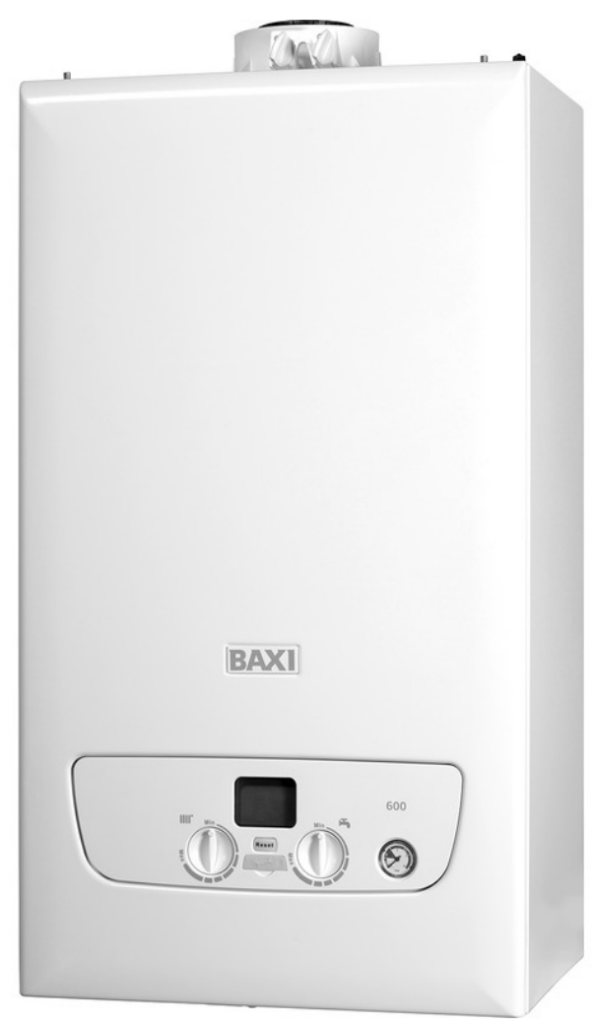
Typically, your boiler installer will recommend the appropriate size depending on your hot water demands and the number of radiators.
Most use a boiler size calculator such as this one here.
This also depends on the kWh or power of your boiler. The higher the kWh, the greater the capacity of your new boiler.
Generally, a smaller house will need a small-sized combi boiler while a larger house will need a medium-to-large sized boiler.
What boiler should I get if I am expanding my property?
If you’re considering adding more bathrooms and expand your total space, we suggest going for a system boiler, granted you have good water pressure.
If your pipes are buried deep with no hope of digging out or you have old radiators installed, go for heat only types.
Boiler types: Our conclusion
We really hope this article has helped you work out which type of boiler your home requires. If you are still unsure you can speak to one of our boiler installation experts online or over the phone.
If you have any questions relating to installation and work to be carried out we can also help! If you think you know, then you can also use our simple boiler comparison tool and buy a boiler online and get it installed the next day!
If you can’t afford to buy a new boiler outright, we are also here to help. You can spread the cost with boiler finance and pay nothing upfront. Simply choose this option at checkout. Happy boiler buying!
Get your Fixed Price Boiler Quotes Online
New Gas Boilers with £0 Deposit & 0% Interest Finance Availble
Get the best quotes for boiler installation online in under 1 minute now
Written by
Get your Fixed Price Boiler Quotes Online
New Gas Boilers with £0 Deposit & 0% Interest Finance Availble
Get the best quotes for boiler installation online in under 1 minute now





